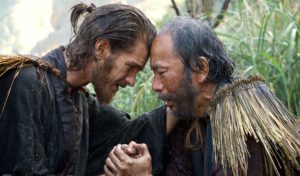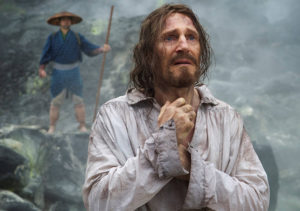 UPDATE: Silence opens around Naples on January 12. Check your local movie theater for showtimes and tickets.
UPDATE: Silence opens around Naples on January 12. Check your local movie theater for showtimes and tickets.
Have you ever questioned what it really means to be a martyr? What pain would you be willing to endure for your faith? Would you watch dozens of others writhing in pain or sent to their death because you were not willing to simply say you did not believe in God? What would you think of a God that allows for such torture to occur and stayed silent while you suffered these trials? These are some of the most powerful questions that are coming to life in the upcoming weeks with the movie “Silence” directed by Martin Scorsese and staring Andrew Garfield and Adam Driver, and derived from the novel of the same name by Shūsaku Endō, one of the most respected modern Japanese authors and Catholic since the age of 11.
 “Silence” tells the story of Catholic Jesuit missionaries and their quest to find their mentor, who was sent to Japan in the midst of the purge of Christianity from the country. At its peak, it was thought there were over 300,000 Catholics in Japan. But, starting 1597 and continuing until the re-opening of Japan to the Western world in 1865, hundreds, if not thousands of Catholics were systematically persecuted, tortured and forced to apostatize, meaning to renounce their religion. These Jesuits attempt to find a way into this country and are met by Catholic Japanese that are so devoted, they are willing to endure these trials for their faith, and it makes them question their own strength and devotion. They are especially concerned because their teacher was said to have apostatized and is now living with the torturers, rather than taking the path of honorable martyrdom.
“Silence” tells the story of Catholic Jesuit missionaries and their quest to find their mentor, who was sent to Japan in the midst of the purge of Christianity from the country. At its peak, it was thought there were over 300,000 Catholics in Japan. But, starting 1597 and continuing until the re-opening of Japan to the Western world in 1865, hundreds, if not thousands of Catholics were systematically persecuted, tortured and forced to apostatize, meaning to renounce their religion. These Jesuits attempt to find a way into this country and are met by Catholic Japanese that are so devoted, they are willing to endure these trials for their faith, and it makes them question their own strength and devotion. They are especially concerned because their teacher was said to have apostatized and is now living with the torturers, rather than taking the path of honorable martyrdom.
One of the most important themes of this book in my mind is the universality of the Catholic Church, which truths and fullness are able to resonate to all various people of the world, no matter their cultural differences. In fact, the author Endō states:
But after all it seems to me that Catholicism is not a solo, but a symphony… If I have trust in Catholicism, it is because I find in it much more possibility than in any other religion for presenting the full symphony of humanity.
I hope that if we ever have to meet the silence of the questioning of our faith that Father Rodrigues deals with throughout this powerful novel, we can rely on each other and see the love of Christ in the eyes of those around us. As we prepare to celebrate the birth of our Savior, Jesus Christ, I hope we can all see the beautiful symphony that is both the Catholic Church and all of humanity, working together in joy, love and respect.
